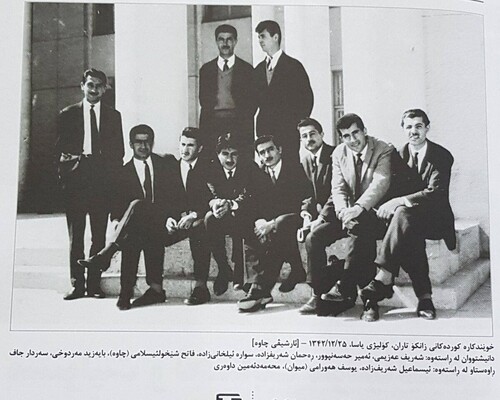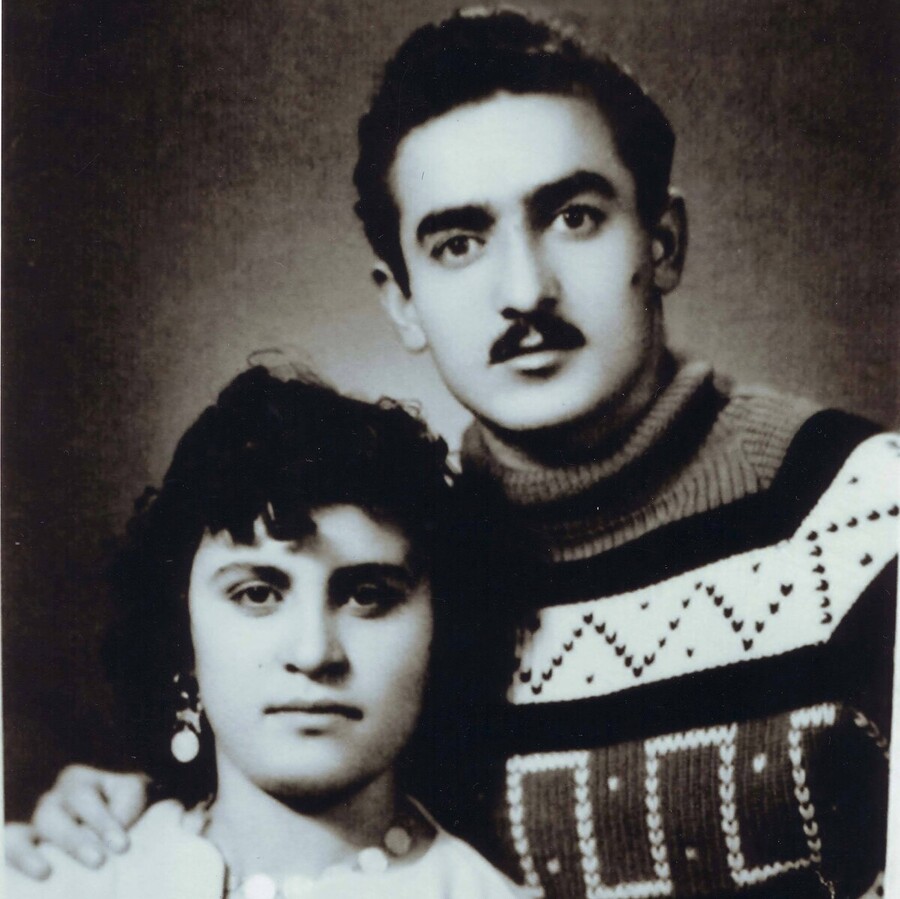Swara, as an innovator poet was motivated by a dream of starting a new field in the Kurdish language and looking for a different type of writing in local, adjacent, and international literature. A look at the "Tapo u Boomalel" which shows how Swara was a knowledgeable and intellectual figure, shows that he was aware of world literature and the literature of neighboring nations, especially Persian.
The middle of the twentieth century is considered to be a golden period and a brilliant experience in Iranian history in all fields of culture, political or literary culture. During this period, poets such as Mehdi Akhavan Sales, Ahmad Shamlou, Frough Farukhzad, Sohrab Spehri, and others were consolidating the innovative experience of Persian poetry, and their best and strongest works were published in this period.
Swara Ilkhanizadeh and a group of Kurdish students and literary activists approached the Persian cultural centers during this critical period, and therefore their intellectual experience and the form of Persian writing influenced their thoughts and context. They paid attention to a significant difference between the form of literature common in Kurdish writings and the prevalent trend. Obviously, the new way of writing and expression of Persian-speaking poets affected them and they started writing and creating literary texts in Persian.
Among those students, Hawar, Chawe, and Swara took the world of literature more seriously. The influence of Persian poetry of that time on the texts of these young authors is worthy of examination on several levels.
First, the style of "social symbolism" in which some of these poets, including Nima and Shamlou, were experts.
Second, archaeological discourse at the level of language, returning to ancient myths of Iranian history, looking at the historic and prehistoric periods of Iran became the basis of their thinking for writing, an example of which can be found in the works of Akhavan Sales and Hamid Mosaddegh.
Third, a critical feminist discourse or thought with a flexible approach that was different from all previous movements that Frough represented.
Each of the Iranian poets of that time followed one of these trends; however, there were other poets who were creating outside these movements. For instance, we can mention Yadollah Royaee, Bijan Jalali, Ahmad Reza Ahmadi, and others, who wrote poetry in a different style however, the general style fits somehow into that framework.

How could Swara Ilkhani Zadeh, as a creative poet who had decided to write in a different language, make up his mind on choosing a base for writing his texts?
An answer that many people may desire is to wish Swara was the initiator of a movement, not a follower of the form of literature of neighboring nations or world literature. This desire may have many literary and non-literary reasons. The most possible reason is to ignore the cultural scope of nations and the influence of literary trends of close cultures on each other. On the other hand, neglecting the common historical and even cultural sources, and consequently being co-destined due to the experience of a general policy governing the country should have been remarkable, but the literary desire for change has been neglected. Thus, the common resources shadow the general cultural policy, and they influence the life, thought, and intellectual products of society. That very discussion may lead one to this error; that being a pioneer can be judged by the shining of one's context in the circle of national literature, without regard the foreign cognitive and literary sources. This indicates being inexperienced in assessing a nation's literary situation and cultural boundaries for innovation.
Swara as an innovator who is motivated by a dream of starting a new field in the Kurdish language has to look for a different type of writing in local, adjacent, and international literature. A look at the "Tapo u Boomalel" which shows how Swara was a knowledgeable and intellectual figure, shows that he was very aware of world literature and the literature of neighboring nations, especially Persian. For example, we can consider Western poets such as Yeats, William Blake, Shakespeare, John Keats, and others, and people such as Akhavan, Shamlou, Nima, and Frough in Persian literature, to comprehend the level of his knowledge about world literature. On the other hand, the study of Kurdish poets such as "Atri Glolani", "Goran", "Sherko", etc., shows that he had studied all Kurdish poetic trends in East and South Kurdistan and the new capabilities and opportunities of each. Swara not only had regarded them all but also, discussed and analyzed them as well.
In other words, Swara was aware of the three experiences of Western literature, Persian literature, and new Kurdish literature, and with a comprehensive knowledge of all Kurdish and Persian writing styles, he began to innovate in literature.
The town
My beloved!
My heart is full of agony
I wish to leave your town
By a glass of water from my village spring
I wish to relieve my heart’s agony,
From the pain, I feel for your absence
I'm fed up with the town’s noises and its roar
Of the day of mucus, sickness, and night fever
I wish to leave your town
The town which makes people’s eyes get blind by the neon lights
To go to the village where the moon will flow in my smile
How could I live in your city
When I am against cheating?!
From your town, which is the symbol of iron and dome
Love pigeon is a foreigner
Around my hands and feet
The warp and weft feel like a chain
What is a statue is a figure of a scarecrow
Every tower is a gallow
In your town the smoke lasso
Coming from wealthy homes’ chimneys
Imprisons the innocent Sunbeams
There is moaning in every street and alley
Coming to my heart
It is not a familiar warm hand I’m shaking
It's a wooden hand
In your town, the lion is humiliated
Fox is the leader
Every peek causes sickness to me
I wish to leave your town
Darling, the region of swamp
How can become a garden?
In your town with its high towers
Your town
My beautiful deer!
Is narrow for love and wide for sorrow
Who in your town, in the town of the murderer of the poor
Listens to the word of Heart’s book?
I am the corner of my village’s hot sun
Can’t feel safe in the streets of your town
My body is not acquainted with them
Spring lingers on my village hillsides forever
It gives red and blue colors
To my poetry and bright emotions
I wish to leave your town, my dear
1970









